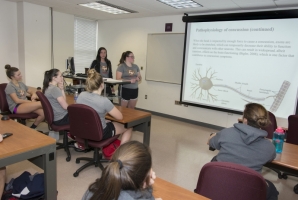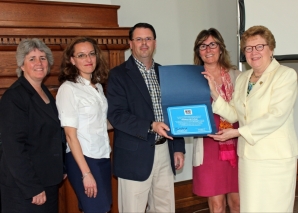
Chestnut Hill College has announced the formation of the Center for Concussion Education of Chestnut Hill College, whose purpose is to create a nationally recognized interdisciplinary center for concussion education, research and policy.
The Center’s leadership team consists of William Ernst, Psy.D., associate professor of psychology and executive director, Meredith Kneavel, Ph.D., professor and chair of the undergraduate psychology department and director of research and program evaluation, Lynn Ortale, Ph.D., vice president for student life and the team’s director of marketing and strategic planning, and Lynn Tubman, M.Ed., director of athletics and the team’s director of community engagement.
Concussions are big news. From “Concussion,” the movie starring Will Smith, to the risks posed to professional football players, concern about this form of brain injury has been steadily growing among the general public and especially among the scientific
and athletic communities.

Setting the Stage
About a year ago, a team from CHC was selected as a Phase One winner of the Mind Matters Educational Programs Challenge posed by the National Collegiate Athletic Association (NCAA) and the U.S. Department of Defense (DOD). The intent of the challenge was to advance understanding of how to change the culture, attitudes and behavior about concussion in young adults and improve concussion awareness education programs delivered to collegiate student-athletes, service members and their coaches and trainers.
Their proposal, the Chestnut Hill College Peer Concussion Education Program, was one of six proposals nationwide to win a $25,000 prize and a $75,000 award in the Mind Matters Challenge. This education challenge called for NCAA members and others to create educational programs and materials to meet their goal of “providing compelling, research-based models that create a cultural dynamic in which every head injury is reported and managed properly, rather than being concealed from peers, coaches or others.”
The $75,000 award provided financial support to develop and implement the Chestnut Hill College Peer Concussion Education Program, whose goal is “to change the culture surrounding concussion from inside the team, rather than relying on outside experts to have a significant impact,” says Ernst.
The program was developed to translate to military service members and other at-risk populations and will result in an online manual providing a step-by-step approach for implementing the peer concussion education program as well as downloadable and modifiable educational materials so that other colleges, high schools and the military can adapt it to meet their needs. Contents will include video segments demonstrating the role of student-athletes, coaches, administrators and healthcare professionals in the peer education program.
The Center for Concussion Education of Chestnut Hill College
The Center’s mission is to develop, disseminate and evaluate concussion education programs intended for athletes in youth, high school and collegiate sports as well as coaches, officials, parents and military service personnel. One of its first objectives is to disseminate the peer education program to appropriate CHC sports teams, beginning with the men’s lacrosse and women’s soccer teams. Plans to extend this to sprint football, women’s lacrosse and men’s soccer teams are in place for the fall. Eventually, it is hoped that the program will be extended to teams from the 13 schools in CHC’s athletic conference, the Central Atlantic Collegiate Conference (CACC).
Two student-athletes from the women’s soccer team, Brianna Ferrell and Meghan Guagenti, and two from the men’s lacrosse team, Matthew Pedrick and Andrew Hildebrand, are serving as peer concussion educators. Brendan Connell, assistant athletic trainer, has been instrumental in assisting with the peer education sessions. Their role is to reinforce and enhance their teammates’ knowledge about concussion and help create an environment where reporting concussion is the norm.
Long-term plans call for the roster of services to include in-person seminars and training, program development and consultation to youth leagues and continuing education courses for athletic trainers, nurse practitioners, psychologists and healthcare professionals.
Of course, the original grant and prize money will stretch only so far, and additional funding is being sought for ongoing research around concussion education and to examine the effectiveness of the peer education program.
Research is Another Key Focus
“The current culture often encourages players to ‘play through it, don’t let the team down, don’t miss a minute of the practice or the game,’” says Kneavel, who leads the center’s research component. “Tough it out … lots of student-athletes feel this way.”
She is currently researching the outcomes of the initial peer concussion education program (along with Ernst, Kevin McCarthy, Ph.D., assistant professor of psychology, and doctoral student Bethanie Paddock), and says that a few main areas are being assessed to see if there is a change in general knowledge and thinking about concussion after the program. “We are educating the athletes to understand the importance of this for their health and that of their team. The best thing is to rest and come back 100 percent strong.”
Initial research has shown that CHC’s athletes have a good knowledge base about concussion and follow-up measurements will ascertain the growth of that knowledge after the peer-to-peer training.
Education modules have been developed that target the types of self-talk that may prevent timely reporting of concussions, with the goal of changing how we think about such reporting. Focus groups with athletes will aid in understanding the way concussions are thought of, and key information from these conversations will provide direction for further education.
The Center’s efforts are fully supported by CHC’s administration, including Wolfgang Natter, Ph.D., vice president of academic affairs and dean of the faculty, who is spearheading initiatives to find additional grant opportunities to support their work, and who has encouraged the incorporation of the Center’s efforts with the researchers’ other academic endeavors.
“The Center for Concussion Education is portentous not only in its promise to address a significant issue of our time, but also for highlighting the significant capacity of our College community to collaboratively address such issues across all sectors, in this case, Academic Affairs, Student Life, and Athletics,” says Natter. “The Center and the College are blessed to have these talented and passionate colleagues devoted to its endeavors.”
—Brenda Lange
Condensed from an article in the spring issue of Chestnut Hill magazine. Read the full story here.



